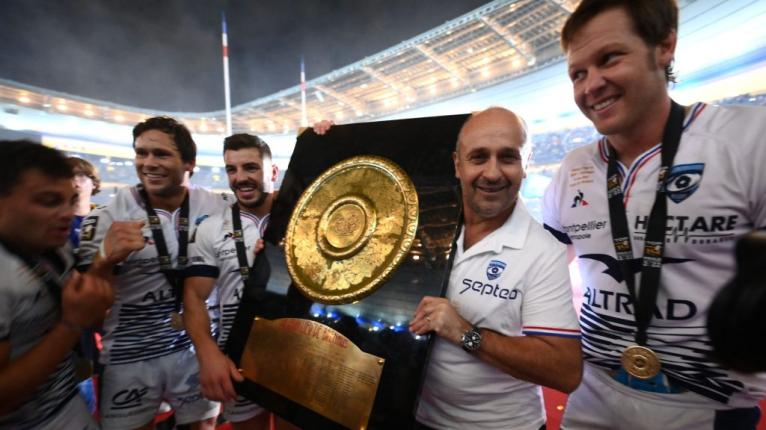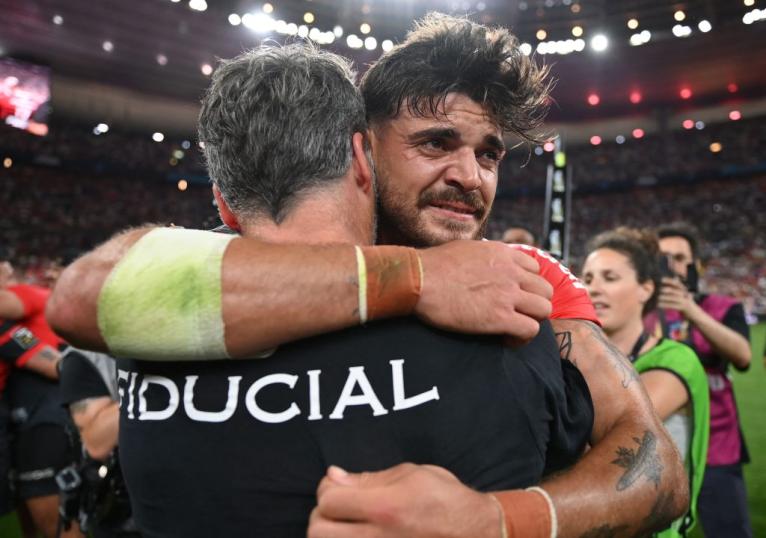Ugo Mola was asked earlier this month if he fancied coaching France in the future. Not really, replied the man who has resurrected Toulouse in recent years. “The way the French team operates today is not the way I’m used to working,” he said.
What about one of the southern hemisphere giants? After all, neither Australia nor the All Blacks are the force they once were. Mola didn’t appear interested. Then he perked up. “Strangely enough, if there was one nation that could attract me, it would be England,” he exclaimed. “They seem to have the best talent pool.”

He then laughed it off, making a quip about not enjoying Shakespeare so that ruled him out of contention.
All the same, might Mola have planted a seed in the mind of the Twickenham – sorry, Allianz Stadium – top brass? How long will they give Steve Borthwick to revive England? He’s had two poor Six Nations championships; might a third be too much for the RFU?
This century the home nations have regularly turned to Australians and New Zealanders but a Frenchman has never been appointed to their top coaching job. One suspects a minority of the England faithful would not welcome a Frenchman in charge. Good grief, an Aussie was bad enough!
Given his success it is perhaps surprising Philippe Saint-Andre remains the only Frenchman to have coached a Premiership club.
When Arsene Wenger was appointed the manager of Arsenal in October 1996 the reactions ranged from scepticism to hostility. ‘Arsene Who?’ was the headline in the London Evening Standard. A Frenchman had never before managed a top-flight English club and some disapproved. “What does he know about English football?” sneered Alex Ferguson, the manager of Manchester United.
Probably not that much at the time, but that was Wenger’s great attribute. He brought a fresh perspective from what he had learned during his coaching career in France and Japan. He was horrified by what the players ate and drank at Arsenal. Out went beer, steak and chips and ‘jam roly poly with custard’. In came steamed fish with rice and broccoli.
He introduced new fitness regimes and training methods, and transformed ‘boring Arsenal’ into one of the most exciting teams in the Premier League, winning the league and cup double in 1998 and 2002.
At the same time Wenger was filling Arsenal’s trophy cabinet, Philippe Saint-Andre became the first Frenchman to coach in the top flight of English rugby. He took Gloucester to the semi-final of the Champions Cup in 2002 before moving to Sale Sharks. In 2006 they won the Premiership title for the first and only time in their history.

Given his success it is perhaps surprising Saint-Andre remains the only Frenchman to have coached a Premiership club. Wenger, on the other hand, has been followed to England by seven of his countrymen, including Gérard Houllier at Liverpool.
This season Toulouse are going for a third consecutive Top 14 title, a feat no club has achieved in the professional era (Toulouse won a hat-trick of titles in the mid-1990s but the first one was claimed in the last year of amateurism).
When Midi Olympique canvassed the opinions a fortnight ago of the Top 14 coaches as to which club was favourite to lift the Bouclier de Brennus next June, nine namechecked Toulouse. Next was La Rochelle with two votes.
It is hard to see how any club can beat Toulouse. They have world class talent in every position, and a new generation of players emerged last season – centre Paul Costes and loose forwards Theo Ntamack and Mathis Castro-Ferreira – to provide them with enviable strength in depth.
Mola has done much to foster this spirit. This is his 10th season in charge and he has nurtured the likes of Antoine Dupont, Romain Ntamack and Julien Marchand, watching them mature from rookies to seasoned internationals.
When Mola was recently asked how he keeps motivated when his club has won four of the past five Top 14 titles and two European and domestic doubles, he replied: ‘What motivates us is that we have an incredible generation, which has just won six titles, and we ask ourselves: are we capable of continuing to nurture it, of not exhausting it?’
Among this generation is English flanker Jack Willis, man of the match when Toulouse beat La Rochelle in last season’s Top 14 final. When I interviewed Willis last year for RugbyPass he explained how, since joining Toulouse when Wasps collapsed in November 2022, he had evolved as a player. “What I’ve tried to work on [is] my skill level, my offload level, to be able to add to that. I don’t just want to add defensively, I want to develop my attacking game and be a big part of that attacking flow.”
After that final, Mola was effusive in his praise of Willis, saying: “We have the impression with Jack that he’s come through our academy. He listens, he works on improving his game and one wonders how far he’s capable of going.”
Willis said there is a family feel to Toulouse, the club looks after its players, from the youth squads up to the professional group.
Mola has done much to foster this spirit. This is his 10th season in charge and he has nurtured the likes of Antoine Dupont, Romain Ntamack and Julien Marchand, watching them mature from rookies to seasoned internationals.
He knows their characters, their physical and mental strengths and weaknesses. This is more important to his coaching than data.

Last November Mola participated in a conference about technological advances in sport. Sure, he said, data – such as medical data and performance indicators – has a role to play. “But these are only aids to decision-making,” he continued. “We mustn’t forget the context in which we make them.”
He then gave an example. A few months earlier, in the dying minutes of the 2023 Top 14 final, the data indicated fly-half Romain Ntamack should be substituted because he was flagging, but Mola left him on. “When he scored the winning try in the 78th minute, he hit his absolute top speed for the season!” said Mola.
In contrast the national coach, Fabien Galthie, places great emphasis on data to inform his team selections before and during matches. When France were winning no-one minded, but after last year’s World Cup defeat by South Africa Galthie came in for a lot of criticism. In particular his substitutions in the second half were questioned with pundits bemused why hooker Peato Mauvaka was hauled off after 60 minutes when he was playing so well.
“Galthie takes people for fools,” said Richard Dourthe, a former international team-mate. “He baffles everyone with his data.”
“Galthie takes people for fools,” said Richard Dourthe, a former international team-mate. “He baffles everyone with his data.”
Borthwick is also a devotee of data, which incurred the wrath of Will Carling in last season’s Six Nations. England, he claimed, were playing poorly because of their ‘data straitjacket’.
It’s been several years since England played with any freedom. Their rugby has become inhibited and repressed. Perhaps they need a Frenchman to undo the straitjacket.


Doesn’t mola realise that the French team would be playing his way if he were the head coach….???
let us say that the national coach position is a political one. He must be approved by the federation but also will have to fight for players against the national league and every club. It might be easier (seen from the outside) with english environment where main players do have a contract with the federation
I agree with you and am really sorry for that. Certainly some politics behind it.
Mola was talking about the différence between coaching a club and coaching a nation. He never talked about the wat french national team was playing...